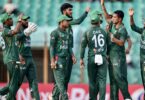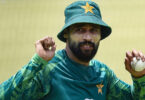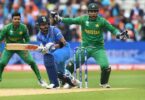Bolton boxer knows he is putting his future on the line by fighting Terence Crawford in New York but says he would love to prove everybody wrong and be a world champion again
It’s a gamble but it is also a motivation,” Amir Khan says as the days drain away before he fights the accomplished and sometimes spiteful Terence Crawford. A week on Saturday, at Madison Square Garden in New York, Khan steps into the ring against one of the best pound-for-pound boxers in the world and faces the possible end of his tumultuous career at the highest level. Of course a surprise victory for Khan, who has lost four times and been knocked out on three occasions, would do the opposite and rocket him towards the forefront of world boxing. This dreamy possibility has convinced the 32-year-old, who made his professional debut in 2005, to gamble heavily.
“I have been fighting for many years and I need this kind of contest to lift me,” Khan says of his WBO world welterweight title bout against Crawford. “It’s a fight to keep me in the sport, to give me the love for it. I believe I can win but everyone thinks all the odds are against me. He’s unbeaten but this is what I need. This is a fight that can make me a world champion again and I feel that God has given me this chance. Beating Crawford will transform my career. You need these fights which make you a little nervous.”
Khan is as friendly and as brave as he has always been. I have interviewed him at various stages of his career, from being a brilliant teenager who offered so much dazzling hope when he won a silver medal at the 2004 Olympic Games to becoming an ageing fighter admitting his own vulnerabilities. He has never been less than open and engaging while shrouded in a naivety that has seen him make a string of bad decisions in and out of the ring. Khan has been stretched out on the canvas as his personal mishaps have been matched by the knockout blows he has suffered.
Yet he retains the blistering hand speed that offers his best chance against Crawford. “It’s definitely a big factor,” he says. “I don’t think he can deal with my speed. He |has never faced anyone as quick as me.”
His other lingering hope is that Crawford’s 34-0 record includes many respectable opponents but not one outstanding rival. At 31, the American needs to prove his mastery against an elite operator. “Exactly,” Khan exclaims. “His last three opponents [José Benavidez, Jeff Horn and Julius Indongo] I would have beat easy. The only opponent of his you could pick out is Breidis Prescott [the Colombian who knocked Khan out in 2008] and that was late in Prescott’s career.
“I would have destroyed Prescott if I’d fought him then. Crawford’s taking a big step up against me. Compare his résumé to mine and I am light years ahead.”
Khan still looked vulnerable in his last fight, which he won on a wide decision against Samuel Vargas, a journeyman. He was blistering in the opening round, dropping Vargas, before being knocked down in the second.
“I trained hard but, after 35 fights, I took the guy too lightly,” he suggests. “When I knocked him down I thought it was going to be easy. And then he caught me. But I got up and won big on the scorecards. It was not a great performance but I might not have got this fight without Vargas. Crawford knows I’m still a big name but he thinks it’s going to be easy.”
Dreams rarely come true for old boxers and Khan is approaching the end. “I am on the last chapter. So I only have a few more fights left in me. I want to get out before there’s any real damage.”
The last time he gambled this hard, Khan went to Las Vegas in May 2016 and fought Saúl “Canelo” Álvarez. The contest was at middleweight, two divisions above Khan’s natural fighting weight, and the outcome was predictable and unsettling. Khan boxed well for four rounds before, in the fifth, the Mexican’s pulverising right hand knocked him out instantly. It was frightening to see Khan lying utterly still on the canvas after a devastating blow – which meant he had to be taken to hospital.
“Canelo was very big, very heavy,” he says. “Boxing-wise I did really well against him. He just had power and, you know, Canelo is very smart. He’s a lot quicker than you think. He went to my body which made me drop my hands and then he came over the top with a right hand. He put everything into it. But I stood there and paused. It was as if I was waiting for that shot to land. So now I have to deny my opponent the opportunity to catch me cold. I should move my feet all the time.”
The only consolation for Khan is that the shattering impact of a single blow is, arguably, less damaging than a sustained beating. “I agree. I am kind of glad I got knocked out three times rather than taking numerous shots. It is better to be taken out by one big punch. Mikey Garcia got beaten up by Errol Spence [as the smaller man also came up two weight divisions last month]. Those drawn-out beatings do more damage. If I took those big shots from Canelo, Prescott and Danny Garcia, and boxed on, the punishment would be far worse.
“Marcos Maidana [whom Khan beat in a brutal battle on points in 2010] caught me with a really big punch but I didn’t go down. After that he landed numerous heavy shots. I don’t remember anything after the fight, which tells you a lot. It shows you how bad those fights are for you. I felt a lot worse after Maidana than after Canelo or any time I was knocked out. My head hurt, my body, face and hands were sore. Everything hurt. I won that fight but it took more out of me.”
Surely Khan must worry about long-term damage? “It bothers everyone but you have to live with it. The one good thing is that, with technology, the scans are much sharper and more detailed. We have all these MRI scans and they’re always comparing results from the past. So medically it’s a lot safer.”
Fighting Crawford is not a safe option. The champion is highly skilled and intelligent as he unpicks his opponent’s flaws. He also hits hard and appears to enjoy inflicting hurt. “Definitely,” Khan concedes. “He shows respect but, inside that squared circle, he goes to war. But in the contract I noticed a rematch clause, which gave me a confidence boost. There must be some doubt in him to have that rematch clause. But Crawford’s a very good boxer and he reads a fight very well. His weakness is that he’s a little wild and can get into trouble. I think it will go the distance and I’ll win by unanimous decision.”
The fight most boxing fans want to see is a welterweight unification contest between Crawford and Spence. Khan believes that “Spence hits harder but, skill-wise, I don’t think he’s as good as Crawford, who is also quicker. Spence might look stronger but, technically, I think Crawford has the edge.”
British fans have craved a fight between Khan and his domestic rival Kell Brook. As happens so often in boxing, an intriguing contest that should have been made years ago may never happen. “Brook’s always going to be there,” Khan insists. “That’s why I took Crawford because I can fight Brook anytime. I didn’t know what Crawford would do next and this is a big fight in America so it was obviously the one to take.”
Money usually decides everything in boxing and, presumably, Khan is making considerably more against Crawford? “You might be wrong there. There is not much in it. I am taking the harder fight because it will test me and mean so much more. Brook is much easier.”
Khan speaks openly about defeat and dejection. “After I lost to Canelo I was out of boxing two years and it was definitely the lowest time of my life because I had lots of problems. I made mistakes and things were not good between my wife and my family. But that made me stronger than ever. I’m so glad I am out of that place because it was very bad. It was a great wake-up call because I could have destroyed my life. Things are much better with my wife and my family. We go to one another’s house and everything is back to normal.”
It must still wound him when he is taunted online? “It does. I’m a tough, strong fighter. It’s the mental hurt when people say bad things that stays.”
There is an undertow of Islamophobia in some of the persistent abuse and it prompts Khan to discuss the recent attack against Muslims in Christchurch. “I am very against Isis but people killing innocent Muslims just makes the situation worse. I saw a report the other day that the percentage of Muslim people in the world who are terrorists is 0.05% – but it’s funny how so many Muslims get branded as terrorists.”
Prejudice has risen markedly in the 15 years since Khan seemed to unite so many in Britain as a 17-year-old Muslim from Bolton who excelled at the 2004 Olympics. He returned home as a symbol of unity but, beyond his personal errors, the world has become bleaker. “I travel the world and it is getting worse and worse,” Khan says. “I see how people who don’t know me judge me. They look uncomfortable or scared I might do something bad.
“At airports I am often pulled aside. I stay very respectful. I had to wait [to be questioned] the last few times I arrived in America. It’s OK. They are doing their jobs for all of us because of the climate we live in. I go into the waiting room and they just have to put my name in a computer to see. Being a boxer changes everything.”
Khan is still an easy target and he sounds wistful. “I get respect but I get lots of hate. People always want to have a go at me but I don’t let them get to me so much now. Your family and close friends are always going to be there. I just have to prove the haters wrong. I would love to prove everyone wrong against Terence Crawford. If I beat him I would get so much respect. It would be one of the sweetest moments of my life.”






